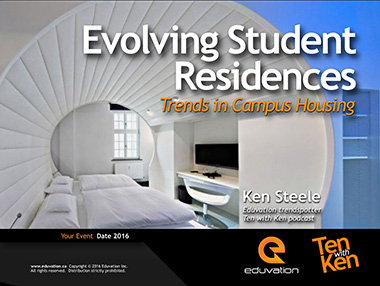Evolving Student Residences
Trends in Campus Housing
New for 2016! 
Campus housing is evolving rapidly to meet the expectations of millennial students and their parents, the demand from international students, and even to better serve commuter students who need to spend time on campus occasionally.
Every year, new facilities are opened with private and semi-private floorplans, lounges and study space, and increasingly luxurious amenities, from full-service restaurants and room service, to saunas, spas, and puppy rooms. Amenities arms races in Canada are nothing compared to those at American colleges (consider for example the $7 million leisure pool at Texas Tech University), but nonetheless the bar keeps rising for luxury campus housing. Some interesting models include the University of Winnipeg’s McFeetors Hall, which combines 172 student dorms with 25 ground-floor townhomes, half reserved for community housing.
In many provinces, capital debt is discouraged for residence construction, so increasingly institutions are turning to P3s (public-private partnerships) to design, build, and sometimes manage student residences (such as Thompson Rivers University, Ryerson University, and SAIT Polytechnic). If institutions don’t build enough residence space, private developers will often swoop in to build apartment towers adjacent to campus. In some cases, student residences are an integral part of the academic mission of the institution, such as the Velocity Residence at the University of Waterloo, a “dormcubator” designed to incubate new student-run businesses (and already a success, considering graduates like Ted Livingston, founder of Kik Interactive, who donated $1 million to establish a seed money fund for future student ventures). Some institutions are dedicating dorm space to commuter students, such as Mansfield University in Pennsylvania. UBC Okanagan has created “Collegia” to provide space to study, cook, socialize, or nap for commuter students on campus. Ryerson University has opened a new commuter hostel, with 9 rooms available to students for $35 per night, on a limited basis.
Some residences are considerably less luxurious. In Terrace BC, Northwest Community College opened a 49-bed campus residence using the same ATCO trailers used in remote work camps – not only a cost-effective solution, but an experiential learning opportunity for trades students. Although the campus housing market seems to be bifurcating, students often demonstrate a resentment of inequality — most recently, Ryerson University students gained international media attention over the #TissueIssue (fancier 2-ply tissue in the administration washrooms on campus). Space in residence may become even tighter yet, judging by the example of modular dorms in Hong Kong, based on the capsule hotels of Japan. Students pay HK$3,500 per month for a 6x4x3′ slot, barely larger than a morgue drawer. Most places in Canada will never see such cramped quarters, but if they do appear, it will likely be in downtown Vancouver, where international students may arrive with less and less expectation of personal space.
Ken Steele is Canada’s leading higher education monitor and futurist. He co-founded Academica Group, created the Academica Top Ten, manages Eduvation Inc, co-authored Canada’s first book on enrolment management, and hosts a weekly webcast, Ten with Ken, that reaches thousands of subscribers on a dozen platforms. Ken brings his unique perspective and insight to a broad range of audiences, from faculty and instructors, boards and senior administration, to information technology staff, concerned parents, and Canada’s most powerful corporate CEOs.
In this workshop, Ken synthesizes a vast array of up-to-the-moment research data, news and forecasts to provide an unparalleled “big picture” view of trends in campus housing and amenities. You can count on Ken to bring up-to-the-moment information, unique perspective, and challenging questions to your team. (Ken will schedule a one-hour call with your leadership, and will review your most recent institutional strategic plan, to help focus the presentation for your needs. Additional research review, discussions and preparation may be desired to maximize the impact of a full-day retreat.)
Here are some relevant episodes of 10K, for a sense of Ken’s approach and as potential examples to share with participants in advance:
All contents copyright © 2014 Eduvation Inc. All rights reserved.








